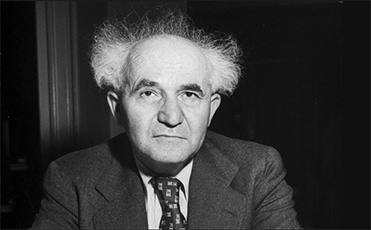Learn about the history of the Palestinian struggle for freedom, equality and justice by exploring major events in the history of their oppression on this day of the year.
7 November
 FOLLOWING 1956 SNEAK ATTACK ISRAEL REJECTS BORDERS
FOLLOWING 1956 SNEAK ATTACK ISRAEL REJECTS BORDERS
On this day in 1956, following the tripartite - British, French, Israeli - invasion of Egypt, David Ben-Gurion addressed the Israeli parliament and declared a great victory, saying that the 1949 armistice agreement with Egypt was dead and buried, and that the armistice lines were no longer valid and could not be restored. Under no circumstances would Israel agree to the stationing of UN forces on its territory or in any area it occupied. He also made an oblique reference to his intention to annex the Sinai Peninsula.
7 نوفمبر
في مثل هذا اليوم من عام 1956 ، عقب الغزو الثلاثي البريطاني والفرنسي والإسرائيلي لمصر ، خاطب ديفيد بن غوريون البرلمان الإسرائيلي وأعلن نصرًا عظيمًا ، قائلاً إن اتفاقية الهدنة لعام 1949 مع مصر ماتت ودفنت ، وأن خطوط الهدنة لم تعد صالحة ولا يمكن استعادتها. لن توافق إسرائيل تحت أي ظرف من الظروف على تمركز قوات الأمم المتحدة على أراضيها أو في أي منطقة تحتلها. كما أشار بشكل غير مباشر إلى نيته ضم شبه جزيرة سيناء
Israeli armed forces had invaded Egypt a week before, attacking towards the Suez Canal, initiating the Suez Crisis. As agreed at the secret tripartite meeting in Sevres, France on October 22. they were to be joined by French and British forces, claiming to be separating Israeli and Egptian forces. The invasion created a serious Cold War problem in the Middle East.
The catalyst for the joint Israeli-British-French attack on Egypt was the nationalization of the Suez Canal by Egyptian leader Nasser four months earlier. Two years earlier, the Egyptian military had begun pressuring the British to end its military presence in the canal zone. Egyptian armed forces also engaged in sporadic battles with Israeli soldiers along the border between the two nations, and the Nasser was in line with popular opinion in his hostility to Israel and support for the Palestinian Arabs driven from their homes eight years earlier.
Supported by Soviet arms and money, following on the United States reneging on a commitment to finance the construction of the Aswan High Dam on the Nile, Egypt nationalised the Suez Canal. The British sought the support of France (which believed that Nasser was supporting the rebellion in the French colony of Algeria), and Israel, for a military attack to seize the canal. The Israelis struck first, but instead of a lightning strike by overwhelming force, the attack bogged down. The United Nations quickly passed a resolution calling for a cease-fire.
This second Arab-Israeli war, also known as the Suez War, aimed at instituting a ‘regime change’ and deposing Gamal Abdel Nasser, the country’s charismatic leader. The attack failed to achieve its goals and marked the decline of Britain’s colonial powers in the Middle East. Outraged that the US had not been informed of the secret attack plan and fearful that the Soviet Union – which had close ties with Egypt – would be drawn into the conflict, US President Eisenhower, sponsored a UN resolution denouncing the attack.
The UN resolution was initially ignored but when the US threatened to cancel vital loans to its European allies hostilities ended after a few days. Nasser lost the war in military terms but he gained politically. The conflict marked the end of British and French domination of the region, and the rise of the US to become the most influential power.
